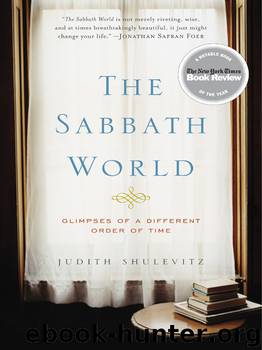The Sabbath World - Glimpses of a Different Order of Time by Judith Shulevitz

Author:Judith Shulevitz [Shulevitz, Judith]
Language: eng
Format: epub
ISBN: 978-1-58836-771-6
Publisher: Random House Publishing Group
Published: 2011-04-04T22:00:00+00:00
5.
IT WAS IGNATIUS, the bishop of Antioch under the Roman emperor Trajan at the very beginning of the second century C.E., who came up with the term “Sabbatizing.” It echoed another term, “Judaizing.” Both terms gave voice to the feeling that it was absurd to adhere to Jewish law in a post-Jewish age. The second-century Roman defender of the faith, Justin Martyr, told a Jew named Trypho, with whom he supposedly debated, that God gave the Jews the Sabbath to punish them—“because of your sins and your hardness of heart.” Justin reasoned from Scripture: Since God loved Noah, Abraham, Isaac, Jacob, and Joseph, and none of them kept the Sabbath, God must have imposed the burden of the Sabbath to make the Jews pay for the sin of worshipping the golden calf. Or, as Justin tells Trypho, “you Jews” demonstrated your innate nature as “a ruthless, stupid, blind, and lame people, children in whom there is no faith.” In much the same way, God gave circumcision to the Israelites to set them apart from the other nations of the earth. The purpose of these unwholesome customs, Justin declared, “was that you and only you might suffer the afflictions that are now justly yours; that only your lands be desolate, and your cities ruined by fire; that the fruits of your land be eaten by strangers before your very eyes.”
The Alexandrian Barnabas, also writing in the second century, thought that Jewish rituals, including the Sabbath, were simple misinterpretations of God’s intent. The physical commandments, Barnabas maintained, were allegories. The most vivid illustration of Barnabas’s spiritualizing hermeneutics can be seen in his discussion of kashruth. Why, asked Barnabas, did Moses say, “‘Thou shall eat neither swine, nor eagle, nor hawk, nor crow, nor any fish that has no scales on it’”? Barnabas explained: When Moses prohibited eating swine, he really meant to tell the Jews to avoid consorting with people who are swinelike, in that their urge to satisfy their hunger drives out every nobler sentiment. The eagle, the hawk, and the raven are predators; likewise, said Barnabas, one should avoid not the flesh of those birds but the company of men like them, “such people as do not know how to obtain their food by sweat and labor, but, in their disregard for law, plunder other people’s property.” And on Barnabas went, a Christian Aesop, reinterpreting every animal whose flesh is prohibited by Jewish law as a miniature moral fable.
As for the Sabbath, Barnabas said it should not be seen as the seventh day of the week; rather, it should be seen as the seventh day of Creation, and also as the seventh millennium, that end of time in which God’s son—Jesus, of course—would arrive and destroy a wicked age.
Why did the Jews fail to understand their own prophet’s metaphors? It was not given to them to understand. As Barnabas put it, the Jews circumcised their bodies, not their ears.
Download
This site does not store any files on its server. We only index and link to content provided by other sites. Please contact the content providers to delete copyright contents if any and email us, we'll remove relevant links or contents immediately.
The Power of Habit by Charles Duhigg(3124)
Man's Search for Meaning by Viktor E. Frankl(2665)
Mckeown, Greg - Essentialism: The Disciplined Pursuit of Less by Mckeown Greg(2427)
MOSES THE EGYPTIAN by Jan Assmann(2411)
Devil, The by Almond Philip C(2324)
The Complete Dead Sea Scrolls in English (7th Edition) (Penguin Classics) by Geza Vermes(2270)
Unbound by Arlene Stein(2267)
I Capture the Castle by Dodie Smith(2034)
Schindler's Ark by Thomas Keneally(1876)
The Invisible Wall by Harry Bernstein(1799)
The Gnostic Gospel of St. Thomas by Tau Malachi(1782)
The Bible Doesn't Say That by Dr. Joel M. Hoffman(1676)
The Secret Doctrine of the Kabbalah by Leonora Leet(1601)
Political Theology by Carl Schmitt(1577)
The Jewish State by Theodor Herzl(1533)
A History of the Jews by Max I. Dimont(1523)
The Dead Sea Scrolls Bible by Martin G. Abegg(1507)
The Book of Separation by Tova Mirvis(1485)
Oy!: The Ultimate Book of Jewish Jokes by David Minkoff(1361)
